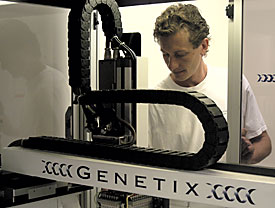 |
|
JOSHUA SILLS /Arizona Summer Wildcat
|
Research technician Olin Feuerbacher gives a demonstration of the Q-Bot. The Q-Bot is a robot that separates cell colonies and aids in sequencing the rice genome.
|
|
By Ian Musil
Arizona Summer Wildcat
Wednesday July 2, 2003
By studying grains at University of Arizona, a plant sciences research team is hoping to bring the UA more bread.
Sequencing rice Chromosome 10, a piece of the biological "blue prints" that govern the grass' development, a research team lead by Rod Wing in the plant sciences department established UA's lead role in the International Rice Genome Sequencing Project.
Vice President of Research at UA, Dick Powell, called the accomplishment a significant step forward for biological sciences and said it brings Wing's department well-deserved recognition.
"This establishes plant science's lead position in an international effort," Powell said. "We are very proud of the work Dr. Wing has done since we brought him here last year."
Plant sciences department Head Rob Leonard pointed out the way this breakthrough, published in Science Magazine early last mouth, improves the department's blossoming reputation and helps other plant sciences faculty who seek public funding.
"This gives us the international visibility that positions plant science faculty for more major funding on the horizon," Leonard said.
The rice genome cooperative is composed of research groups from 10 countries, including labs in Japan and China where sequences for the first and fourth rice chromosomes were published earlier this year. Recent success with Chromosome 10 has put the Wing lab out in front of these competitors for the $90 million budgeted by the National Science Foundation for plant genomic research. Wing expects to win a substantial amount of the money awarded in the September grant.
"We have a good chance to get a fair portion of the (NSF) funding," Wing said, hoping the funding will attract more young scientists to his lab that currently employs 40 graduate students, undergraduate students and research technicians.
 |
|
Our department is an example where President Likins' Focused Excellence is working. We're so strong in terms of funding, faculty, and research ... we are a center of excellence
- Rod Wing,
plant sciences researcher
|
 |
Wing came to the UA last spring from Clemson University in a move that countered the recent flight of several researchers from the UA in a phenomenon called "brain drain."
Among those who left the university for better paying jobs at other institutions in recent years was Vernon Smith, an economist who won a Nobel-Prize in October 2002 ÷ 18 months after he left the UA. Last month, four top researchers left the chemistry department for the Georgia Institute of Technology.
Wing dubbed his move to Tucson, "anti-brain drain" and said he came to the UA for opportunities in the plant sciences department.
"Our department is an example where President Likins' Focused Excellence is working. We're so strong in terms of funding, faculty and research · we are a center of excellence."
Plant science regents professor Vicki Chandler agrees and says Wing's recent accomplishments attest to the quality of the scientists working in her department.
"We have one of the strongest plant-genomic research groups in the country. I enjoy working with everyone in this department and the synergy between staff is unbelievable. That's why I came to UA," Chandler said.
Carol Soderlund, a top computer expert and founder of the sequencing software used in the Human Genome Project, came to the UA with Wing last spring. She said her motivation for coming to Tucson was similar to his.
"There's a lot of good biology going on here, " said Soderlund.
Powell said he is proud of both researchers and anticipates more experts will be drawn to the department in the future
Rice is the number one international crop and is the primary food source for over half the world's population. Many of the countries that depend on rice are in the third-world, where populations are expected to grow rapidly in the next decade.
Decoding the rice genome helps researchers understand the elements that regulate the plant's tolerance to disease and drought. With this knowledge, researchers can develop stress resistant rice strains that produce high yield crops critical to third-world agriculture. In Asia, this farming has already begun.
On the 10th chromosome alone, researchers from Wing's group already found 40 genes that affect resistance.
"Once you figure out where all these genes are, you can breed for stress resistance," said Wing, who insisted that a high yield rice is possible without the use of biological engineering.
Have something to say about this story? Contact us at letters@wildcat.arizona.edu.

